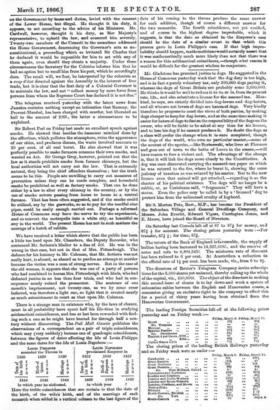Mr. Gladstone has promised justice to dogs. He-suggested in the
House of Commons yesterday week that the dog duty is too high, and is in fact .purely voluntary tax, only 300,.000 dogs paying it, whereas the dogs of Great Britain ,are probably some 3,000;000. Etc thinks it would' e well to reduce it to .43..or 5a. from its present rate, 12s., and also substitute a licence -for.the assessed tax. Man- kind, he says, are strictly divided into dog-lovera and dog-haters, and all who are not lovers of dogs are haters.of dogs. Very kindly therefore he proposes -to meet the views of both parties, by making dogs cheaper to keep far dog-levers, and at the same time making it easier for haters of dogs to-fasten the responaibility of the dogs on the owner, who will be liable to be.asked at any time for his licence, and to lose his dog if he cannot produce it. No doubt the dogs as a •class will prefer the change when it is once completed, though the dogs of the world, who own no particular master,--some of the acutest of the -species,—like Borkowski, who lives at Florence and goes out of town to the baths -of Lucca in the season,—will have reason to fear a violent end. The advantage of the change is, that it will huh the dogs more closely to the Constitution. A dog was once discovered carrying the assessed-tau paper on which he was entered to the fire, where he burnt it, showing the same jealousy of taxation as was evinced by his master. But -to the new licence even that animal will get attached,—regarding it •as the charter of his political existence. The dogs will no longer be a rabble, or, as Coriolanus said, "fragments"' They will have a status. 'Even the police may be called in by licensed' dog to protect him from the unlicensed cruelty of boyhood.






























 Previous page
Previous page